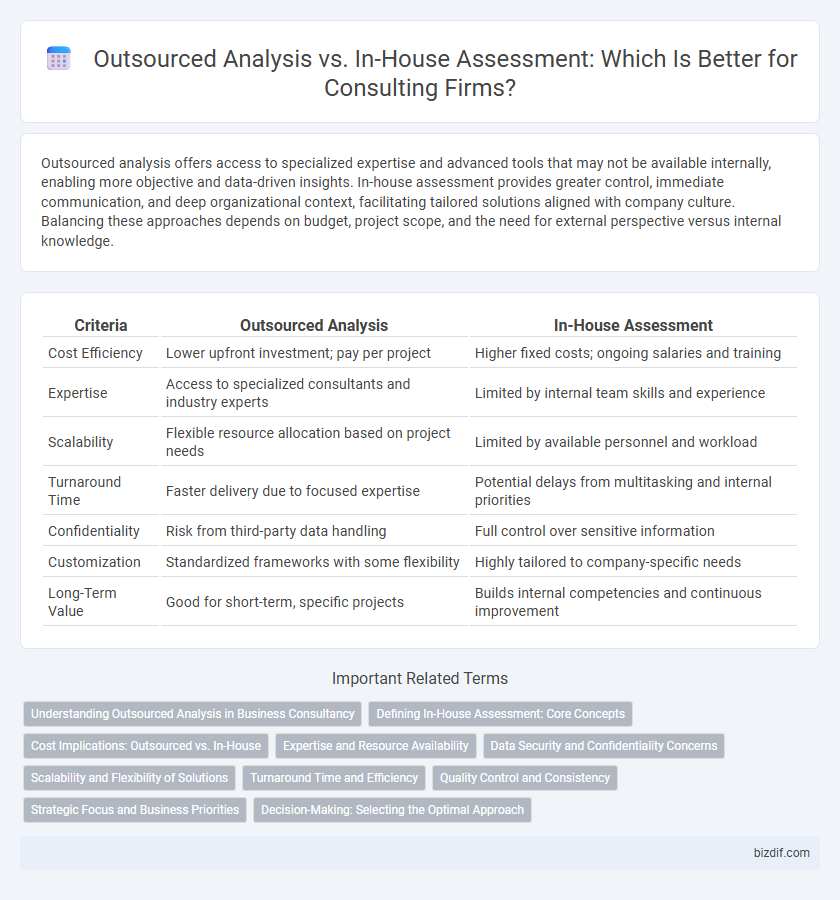Outsourced analysis offers access to specialized expertise and advanced tools that may not be available internally, enabling more objective and data-driven insights. In-house assessment provides greater control, immediate communication, and deep organizational context, facilitating tailored solutions aligned with company culture. Balancing these approaches depends on budget, project scope, and the need for external perspective versus internal knowledge.
Table of Comparison
| Criteria | Outsourced Analysis | In-House Assessment |
|---|---|---|
| Cost Efficiency | Lower upfront investment; pay per project | Higher fixed costs; ongoing salaries and training |
| Expertise | Access to specialized consultants and industry experts | Limited by internal team skills and experience |
| Scalability | Flexible resource allocation based on project needs | Limited by available personnel and workload |
| Turnaround Time | Faster delivery due to focused expertise | Potential delays from multitasking and internal priorities |
| Confidentiality | Risk from third-party data handling | Full control over sensitive information |
| Customization | Standardized frameworks with some flexibility | Highly tailored to company-specific needs |
| Long-Term Value | Good for short-term, specific projects | Builds internal competencies and continuous improvement |
Understanding Outsourced Analysis in Business Consultancy
Outsourced analysis in business consultancy leverages external experts to provide specialized insights, often resulting in cost-efficiency and access to advanced tools that may not be available in-house. It enables companies to scale their analytical capabilities quickly and tap into diverse industry knowledge without the burden of developing internal resources. This strategic approach enhances decision-making by delivering objective, data-driven evaluations that align with business goals.
Defining In-House Assessment: Core Concepts
In-house assessment involves conducting evaluations using internal resources and expertise tailored to an organization's specific needs, ensuring confidentiality and direct control over processes. It emphasizes leveraging existing employee knowledge to align analysis closely with corporate objectives and culture. This approach often results in faster decision-making and adaptation due to immediate access to internal data and stakeholders.
Cost Implications: Outsourced vs. In-House
Outsourced analysis often reduces fixed costs by eliminating the need for permanent staff and infrastructure, offering scalable solutions tailored to project demands. In-house assessments incur higher upfront investments in recruiting, training, and maintaining expert teams, potentially leading to increased long-term operational expenses. Cost efficiency depends on project complexity, frequency of analysis, and the ability to leverage external expertise without compromising data security.
Expertise and Resource Availability
Outsourced analysis leverages specialized expertise and advanced tools not always available in-house, ensuring high-quality insights and innovative approaches. In-house assessment benefits from intimate organizational knowledge and immediate access to internal data, but may lack the breadth of skills and scalability offered by external consultants. Balancing resource availability with expertise needs is critical for selecting the optimal consultancy model.
Data Security and Confidentiality Concerns
Outsourced analysis often raises significant data security and confidentiality concerns due to third-party access to sensitive information, increasing the risk of breaches and compliance issues. In-house assessments enable tighter control over data governance frameworks, ensuring adherence to internal protocols and regulatory requirements. Companies must evaluate the trade-offs between cost efficiency and the heightened security risks associated with external data handling in consultancy projects.
Scalability and Flexibility of Solutions
Outsourced analysis offers superior scalability, enabling businesses to quickly adjust resource allocation based on project demands without long-term commitments, unlike in-house assessments that often require fixed staffing and infrastructure investments. Flexible solutions from external consultancies adapt to varying data needs and market conditions, providing customizable expertise across multiple domains, whereas in-house capabilities may be constrained by internal skill sets and rigid workflows. Leveraging outsourced analysis enhances agility, reduces overhead costs, and allows organizations to focus on core competencies while accessing cutting-edge analytical tools and methodologies.
Turnaround Time and Efficiency
Outsourced analysis accelerates turnaround time by leveraging specialized expertise and scalable resources that often exceed the capacity of in-house teams, enabling faster data processing and actionable insights. In-house assessments can be limited by internal resource constraints but offer tighter integration with company-specific knowledge, which may impact overall efficiency in rapidly changing project environments. Balancing outsourced analysis with in-house assessment optimizes efficiency by combining speed and domain-specific understanding to meet strategic consultancy goals.
Quality Control and Consistency
Outsourced analysis leverages specialized expertise and advanced technologies to enhance quality control and ensure consistent results across diverse projects. In-house assessment offers direct oversight and immediate access to data, promoting tailored quality measures aligned with company standards. Balancing outsourced precision with internal familiarity optimizes quality control and maintains consistency in decision-making processes.
Strategic Focus and Business Priorities
Outsourced analysis allows companies to maintain strategic focus by leveraging external expertise and freeing internal resources to concentrate on core business priorities. In-house assessments provide greater control and alignment with organizational culture but may divert team attention from critical initiatives. Balancing outsourced analysis with in-house capabilities enhances decision-making agility while ensuring strategic goals remain central to business operations.
Decision-Making: Selecting the Optimal Approach
Outsourced analysis leverages specialized expertise and advanced tools, enabling faster, unbiased insights that enhance strategic decision-making accuracy. In-house assessment offers direct control, integrating organizational knowledge and fostering collaboration for tailored solutions aligned with company culture. Choosing the optimal approach depends on factors like budget, project complexity, internal capabilities, and the need for agility in responding to market changes.
Outsourced Analysis vs In-House Assessment Infographic

 bizdif.com
bizdif.com